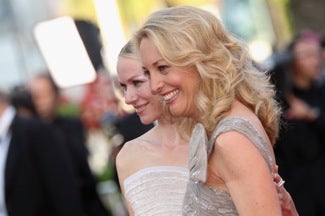In today’s roundup of Cannes news ‘n’ notes from around the web, politics are in the air as the festival enters its final few days.
With Cannes beginning to wind down, Xan Brooks tries to summon the enthusiasm to write about the last few days. But he says that folks on the street are talking more about what filmmakers might be going to Venice at the end of the summer (Malick, Eastwood, Schnabel, Boyle!) than what’s playing on the Croisette. Brooks sees “Fair Game” and is unimpressed, but he says the film “clearly excites the hell out of the French journalist in the row behind.” Or maybe the poor Frenchman was daydreaming about seeing “The Tree of Life” at Venice. (The Guardian)
 “Fair Game” was the biggest new film to screen on Thursday, but it did not seem to catapult itself into Palme D’Or contention. Though most reviews were relatively positive, Doug Liman’s drama about the Valerie Plame affair, with Naomi Watts as Plame and Sean Penn as her husband Joseph Wilson, drew only a smattering of outright raves. Manohla Dargis, in a piece that focuses on how world events are rumbling through Cannes, said the film has “an enjoyable opening hour before disintegrating into melodramatic hooey.” (The New York Times)
“Fair Game” was the biggest new film to screen on Thursday, but it did not seem to catapult itself into Palme D’Or contention. Though most reviews were relatively positive, Doug Liman’s drama about the Valerie Plame affair, with Naomi Watts as Plame and Sean Penn as her husband Joseph Wilson, drew only a smattering of outright raves. Manohla Dargis, in a piece that focuses on how world events are rumbling through Cannes, said the film has “an enjoyable opening hour before disintegrating into melodramatic hooey.” (The New York Times)
(Right, Watts and Plame hit the red carpet together. Photo by Sean Gallup/Getty Images)
In the interests of equal time: Kirk Honeycutt raved about the film: "’Fair Game’ might be one of the best spy movies ever." He also thinks it’ll make money ("above-average coin," in tradespeak), and that it might get awards attention. (The Hollywood Reporter)
Did Doug Liman, the director of “Swingers,” “The Bourne Identity” and “Mr. and Mrs. Smith,” call his entire career a failure at the Cannes press conference that followed a screening of his new film, “Fair Game”? That’s Eugene Hernandez’s take on the director’s comment that the new film “is what I’ve been trying to do my whole career.” Then Hernandez backs off a bit, but says, “at the very least, he admitted that he’s never achieved his ultimate goals with a movie, until now.” (indieWIRE)
If there’s anyone making a quick move into awards contention at the festival these days, it might be Korean actress Yung Jungee, the star of Lee Chang-dong’s “Poetry.” Eric Kohn reviews the gentle, lyrical film (“the title says it all,” he writes), and praises the veteran actress’ performance as an elderly woman facing the onset of senility and the recent death of a young woman driven to suicide by her character’s grandson. The result, Kohn says, is “a moving portrait of creative discovery and the pressures of age.” (indieWIRE)
“There’s a palpable sense of optimism here; everybody has the project that’s going to scorch the earth,” says the writer-director who’s come to Cannes to announce (and sell) his new project. In this case, the writer-director is Mark Hamill, an actor who once made a couple of movies you might have heard about. Steven Zeitchik leaves the festival proper to venture into what he calls “the Cannes underclass,” the Film du Marche market. He sits down with the former Luke Skywalker to talk about optimism, pigeonholing, living in the shadow of “Star Wars” and Hamill’s upcoming directing gig, “The Black Pearl.” Then Zeitchik wonders if Hamill’s optimism is misplaced, given the maelstrom of publicity that Cannes generates: “If everybody gets attention, does anybody?” It might take a Jedi to answer that one. (24 Frames)
David Germain talks to Sony Pictures Classics’ Michael Barker and Tom Bernard, who’ve been coming to Cannes for years to fill out their slate of movies that’ll win favorable reviews, garner a handful of nominations and make a little bit of money. Barker attributes Sony Classics’ success in the Oscar foreign-film race (eight wins in 18 years, and three out of the five nominees this past year) to being “long-term thinkers” – though you could add that the efficiency of SPC, which tends not to overspend or overhype its movies, is what persuades the parent company to give them the money to keep going. So what do they love this year? Well, they bought “Another Year,” which is in competition, and “In a Better World,” which isn’t. Beyond that, Germain doesn’t ask and they don’t tell. (The Associated Press via Yahoo! Finance)
From Cannes, Todd McCarthy praises Sundance. That’s because the U.S. festival puts documentaries front and center, whereas Cannes and other European festivals give them what McCarthy says is “second-class status.” Charles Ferguson’s “Inside Job” is the exception, he says, because it’s political and timely – but even then, he thinks it should have been included in the competition rather than having to settle for an outside slot. (Todd McCarthy’s Deep Focus)


